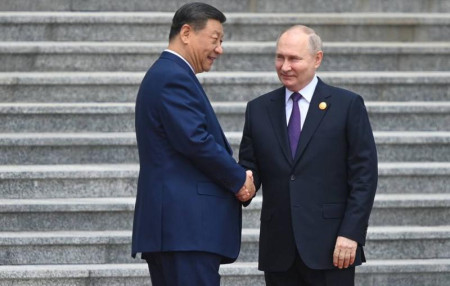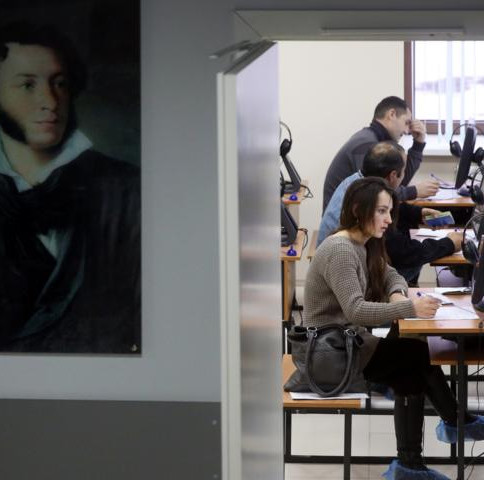
Ukraine seeks US backing for strikes on Russia; assessing Russian President Vladimir Putin’s visit to China; and Russia’s win-win relations with Africa. These stories topped Monday’s newspaper headlines across Russia, according to TASS News Agency.
Nezavisimaya Gazeta: Kiev ready to expand strikes against Russia
Kiev acknowledges the Russian army’s victories on the front lines and anticipates an increase in combat activities by its forces in a variety of directions, Nezavisimaya Gazeta writes. Still,the Ukrainian authorities are not ready to talk peace, and instead intend to step up strikes on key targets in Russia. According to a number of important US media outlets, a Ukrainian delegation is currently visiting the US in an attempt to persuade the White House to increase the flow of intelligence data on the whereabouts of Russian troops, military, and other critical installations in Russia. Kiev also continues to seek official clearance from US leadership to use American munitions against such targets.
According to reports from the special military operation zone, Russia has the advantage throughout nearly the entire line of combat. Kiev is especially concerned about the situation around Kharkov and in Donbass. Apparently, in order to throw Russia for a loop, the Ukrainian Armed Forces are using Western weapons against targets on Russian territory without permission from the United States or NATO, according to Nezavisimaya Gazeta.
In a recent comment to the French and Ukrainian media, Ukrainian president Vladimir Zelensky stated unequivocally that there should be no limitations on the use of Western weapons for strikes on Russia, pointing to Ukraine draft security guarantee agreement with the United States.
US representatives officially reject Kiev’s requests. "The Americans want to have it both ways. According to White House National Security Adviser John Kirby, the US does not encourage or tolerate attacks using US-donated weapons on Russian soil." However, Secretary of State Antony Blinken stated in Kiev that Ukraine itself was free to decide how to deploy these weapons," military expert, retired colonel Vladimir Popov told the newspaper.
According to the expert, unofficially the Ukrainian Armed Forces and the Pentagon have long collaborated on matters such as ensuring Ukrainian Armed Forces strikes and exchanging intelligence data and coordinates of Russian targets in the special military operation zone and border regions.
Now, Popov believes, Kiev wants more. "Kiev’s future targets include military arsenals, storage sites, places for military troops, and so on. This must be prevented both diplomatically by influencing the United States and other Western countries, as well as by military means, eliminating Ukraine’s combat and military-industrial capacity," he said.
Vedomosti: China-Russia rapprochement on the eve of Swiss summit on Ukrainian crisis
President Vladimir Putin visited China last week, his first international trip since taking office for a fifth time. At the concluding press conference with the Russian media, Putin described the visit as "purely a working trip," with the two sides discussing "many topics." He also acknowledged that the Ukraine situation was a topic of discussion in Beijing, with Defense Minister Andrey Belousov and Security Council Secretary Sergey Shoigu taking part in the talks, Vedomosti writes.
Yana Leksyutina, top researcher at the Russian Academy of Sciences’ Institute of China and Contemporary Asia, agreed that Putin’s trip was conventional, but there were tangible results as well, noting to the newspaper that agreements were signed on growing Russian agricultural exports and increasing humanitarian cooperation.
Vasily Kashin, director of the Center for Comprehensive European and International Studies at the Higher School of Economics, believes the primary takeaway from Putin’s remarks following the discussion of Ukraine in China is that diplomatic efforts by all sides are now intensifying, with Russia and China closely working in this regard. "Evidently, Russia believes that China has a critical role to play in putting the issue to bed. The entire saga of settling the Ukrainian problem is now reaching a critical point. While the anti-Russian coalition gets set to hold a summit in Switzerland (in June - Vedomosti), Russia and China are going their own way. If Beijing plays a key role in resolving the Ukrainian conflict, the conclusion of which will define the new world order, China will become one of the primary architects of this new system," he told Vedomosti.
According to Kashin, China believes that the refusal to consider Russia’s legitimate security interests lies at the heart of the Ukrainian issue. "The unbridled expansion of NATO, which has destroyed the balance of security in Europe is seen as the main cause of the conflict," Deputy Director of the IMEMO RAS Alexander Lomanov told Vedomosti.
Countries in the Middle East and Africa are tired of arms races and constant conflicts, and believe it is time to focus on building a multipolar world, Abdul Hadi Al-Hawaij, Minister of Foreign Affairs and International Cooperation of the interim government of Libya (controls the eastern part of the country) said in an interview with Izvestia. According to him, Russia, unlike Western countries, interacts with its partners on the premise of mutual benefit, not force. Moscow’s approach to foreign policy encourages regional players to increase diplomatic ties with Russia, he noted.
"Russia cooperates with the countries of the region on a quid pro quo basis, where everyone benefits from close relations under a policy of equal partnership. This is an incredibly important issue, which is why these countries are more inclined to cooperate with this 'Russian friend,'" the minister said.
He added that at the moment a multipolar world with no distinctions between strong and weak still seems far away. "Nevertheless, today it is necessary to redraw the geopolitical map, taking into account the interests of the Arab and Islamic world," Al-Hawaij noted.
According to the minister, Libya will give a strong boost to bilateral cooperation with Russia. " Russia and Libya have special relations. <...> But at this point, economic and trade relations are not where we want them to be. That is why we want to give a strong push, a strong boost to bilateral cooperation between our countries," he stressed.
Al-Hawaij noted that Russia and Libya cooperate in the economic, trade, and educational spheres, as well as in the energy and grain industries, the production of fertilizers and vaccines. "All these activities are very promising, but we would like to develop, strengthen and expand them to such an extent that they will eventually lead us to relations at a high political level," he added.
Vedomosti: Israeli War Cabinet minister issues ultimatum to Prime Minister Netanyahu
Member of Israel’s war cabinet Benny Ganz has threatened to quit if Prime Minister Benjamin Netanyahu does not provide an action plan by early June for the Gaza Strip following the end of the battle with Hamas, according to The Times of Israel. The War Cabinet was formed shortly following Hamas militants’ attack on Israel on October 7, 2023. It includes Defense Minister Yoav Galant, as well as minister without portfolio Gantz, and Netanyahu.
According to Gantz, Israel’s action plan in Gaza should include six goals: the release of hostages, the liquidation of Hamas, full control of the Gaza Strip, and the formation of a civil administration there that would include representatives from the United States, the European Union, Arab states, and local non-Hamas Palestinians, as well as officials from the Palestinian National Authority. The strategy should also include the Israeli government’s efforts to improve relations with Saudi Arabia as part of a joint war against Iran, as well as the passage of a bill requiring universal military conscription.
In response, Netanyahu stated that acquiescing to the minister’s requests would mean the end of the war and the defeat of Israel, abandoning the majority of the hostages, keeping Hamas intact, and the establishment of a Palestinian state.
After eight months of combat in the Gaza Strip, the Israeli government has yet to reveal the war’s end objectives, inflaming both its citizens and the opposition, editor-in-chief of Middle East Economics magazine Dmitry Maryasis told Vedomosti. According to the expert, this is related to the fact that Netanyahu is more interested in keeping power than ending the conflict and reorganizing Gaza. At the same time, the expert believes that Ganz’s possible exit will not result in the collapse of Netanyahu’s right-wing alliance.
According to researcher at the Russian International Affairs Council Kirill Semenov, Netanyahu is unlikely to give in to Gantz’s demands. The expert told Vedomosti he believes that Netanyahu will continue the conflict in an effort to keep his tenuous grip on power.
RBC: Russian government plans to suspend ban on gasoline exports
Due to an oversaturated fuel market, the Russian government will relax the temporary prohibition on gasoline exports that has been in effect since March 1, 2024, RBC writes citing the Ministry of Energy. Earlier, Deputy Prime Minister Alexander Novak told reporters that the Russian Ministry of Energy approached the government with a proposal to temporarily lift the restriction.
"The temporary ban on gasoline exports, which came into force on March 1, will be suspended due to the saturation of the domestic market and the completion of unscheduled repairs at the refinery," the Energy Ministry told RBC.
"Refining volumes at Russian oil refineries have been restored, the overall situation with the distribution of oil products to consumers has improved, and the regions are completely supplied with motor fuel. Motor gasoline stocks have been built up at refineries and oil depots to meet demand on the homefront completely. As of May 15, the total volume of motor gasoline was 2.1 mln tons, while diesel fuel reached 3.4 mln tons. The export saturation targets for which the export embargo was imposed were met," the ministry said.
Furthermore, removing export limits "will allow individual refineries to increase the volume of raw material processing and production of in-demand oil products." That said, the government will continue to monitor the fuel market.
Alexander Frolov, Deputy General Director of the Russian Institute of National Energy, told RBC that the temporary ban on gasoline exports was reasonable. The measure was implemented not so much to avoid a probable fuel shortage but to "overcome the unreasonable panic in the market due to attacks on refineries," he believes. By April, it was evident that the business could handle drone attacks without collapsing, the expert noted.
TASS is not responsible for the material quoted in these press reviews









